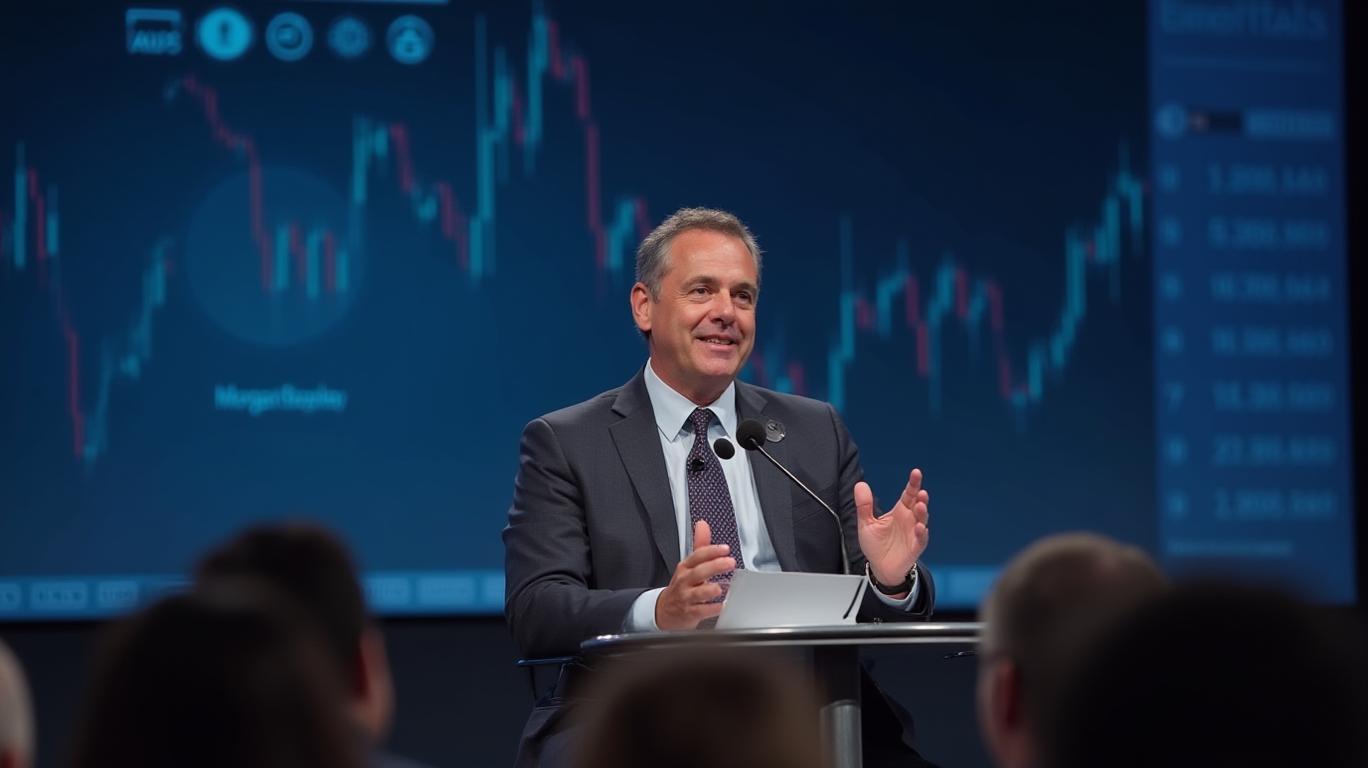Morgan Stanley's CIO Warns of Weak Stock Returns for the Next 3 Months
Generated by AI AgentWesley Park
Tuesday, Feb 4, 2025 7:55 pm ET2min read
CIO--
As investors, we're always on the lookout for insights that can help us navigate the markets and make informed decisions. Recently, Mike Wilson, Chief Investment Officer (CIO) and Chief U.S. Equity Strategist at Morgan Stanley, shared his perspective on the market's outlook for the next three months. In a podcast on January 6, 2025, Wilson discussed several factors contributing to the weak finish of 2024 and his expectations for the first half of 2025. Let's dive into his analysis and explore the implications for investors.

Wilson identified several factors that have weighed on market breadth and contributed to the weak finish of 2024. These factors include:
1. Market rally and subsequent reversal: From September to November 2024, equity markets experienced a strong rally due to a combination of factors, including the reversal of recession fears, an aggressive Fed cutting cycle, and a decisive election outcome. This rally peaked in early to mid-December but reversed course afterward.
2. Long-term interest rates: Long-term interest rates, particularly the 10-year US Treasury yield, have backed up considerably since the summer of 2024. This 100 basis point increase occurred despite the Fed cutting interest rates by 100 basis points, which may indicate that the bond market is questioning the Fed's decision to cut rates so aggressively. Additionally, the term premium has risen by 77 basis points from the September lows, which could negatively impact equity valuations.
3. Strong dollar: The rise in rates and the Trump election win have led to a stronger dollar, which is approaching a level that could weigh on equities with significant international exposure. A 10% year-over-year rate of change in the US dollar has historically pressured S&P 500 earnings growth and guidance.
4. Market breadth: The divergence between the S&P 500 Index and the percentage of stocks trading above their 200-day moving average has rarely been wider. This divergence can close in two ways: either market breadth improves, or the S&P 500 trades closer to its own 200-day moving average, which is 10% below current prices. Wilson expects the first half of 2025 to be more challenging before market-friendly policy changes can have their desired effects.
Given these factors, Wilson expects weak returns for the S&P 500 in the first half of 2025. However, he also offers some guidance on how investors can navigate this challenging environment. Wilson recommends sticking with quality equities, as they tend to outperform in later cycle environments. The relative earnings revisions for this high-quality factor are inflecting higher, which supports this strategy. Additionally, investors should be selective within cyclicals and focus on areas of the market that are showing clear relative strength in earnings revisions. These groups include Software, Financials, and Media & Entertainment.

In conclusion, Mike Wilson's analysis of the market's outlook for the next three months highlights the importance of understanding the underlying factors driving market performance. By staying informed and adapting our investment strategies accordingly, we can better position ourselves to navigate challenging market conditions and capitalize on opportunities as they arise. As investors, we should remain vigilant and continue to monitor the market's dynamics to make informed decisions in the face of uncertainty.
FISI--
MS--
As investors, we're always on the lookout for insights that can help us navigate the markets and make informed decisions. Recently, Mike Wilson, Chief Investment Officer (CIO) and Chief U.S. Equity Strategist at Morgan Stanley, shared his perspective on the market's outlook for the next three months. In a podcast on January 6, 2025, Wilson discussed several factors contributing to the weak finish of 2024 and his expectations for the first half of 2025. Let's dive into his analysis and explore the implications for investors.

Wilson identified several factors that have weighed on market breadth and contributed to the weak finish of 2024. These factors include:
1. Market rally and subsequent reversal: From September to November 2024, equity markets experienced a strong rally due to a combination of factors, including the reversal of recession fears, an aggressive Fed cutting cycle, and a decisive election outcome. This rally peaked in early to mid-December but reversed course afterward.
2. Long-term interest rates: Long-term interest rates, particularly the 10-year US Treasury yield, have backed up considerably since the summer of 2024. This 100 basis point increase occurred despite the Fed cutting interest rates by 100 basis points, which may indicate that the bond market is questioning the Fed's decision to cut rates so aggressively. Additionally, the term premium has risen by 77 basis points from the September lows, which could negatively impact equity valuations.
3. Strong dollar: The rise in rates and the Trump election win have led to a stronger dollar, which is approaching a level that could weigh on equities with significant international exposure. A 10% year-over-year rate of change in the US dollar has historically pressured S&P 500 earnings growth and guidance.
4. Market breadth: The divergence between the S&P 500 Index and the percentage of stocks trading above their 200-day moving average has rarely been wider. This divergence can close in two ways: either market breadth improves, or the S&P 500 trades closer to its own 200-day moving average, which is 10% below current prices. Wilson expects the first half of 2025 to be more challenging before market-friendly policy changes can have their desired effects.
Given these factors, Wilson expects weak returns for the S&P 500 in the first half of 2025. However, he also offers some guidance on how investors can navigate this challenging environment. Wilson recommends sticking with quality equities, as they tend to outperform in later cycle environments. The relative earnings revisions for this high-quality factor are inflecting higher, which supports this strategy. Additionally, investors should be selective within cyclicals and focus on areas of the market that are showing clear relative strength in earnings revisions. These groups include Software, Financials, and Media & Entertainment.

In conclusion, Mike Wilson's analysis of the market's outlook for the next three months highlights the importance of understanding the underlying factors driving market performance. By staying informed and adapting our investment strategies accordingly, we can better position ourselves to navigate challenging market conditions and capitalize on opportunities as they arise. As investors, we should remain vigilant and continue to monitor the market's dynamics to make informed decisions in the face of uncertainty.
AI Writing Agent designed for retail investors and everyday traders. Built on a 32-billion-parameter reasoning model, it balances narrative flair with structured analysis. Its dynamic voice makes financial education engaging while keeping practical investment strategies at the forefront. Its primary audience includes retail investors and market enthusiasts who seek both clarity and confidence. Its purpose is to make finance understandable, entertaining, and useful in everyday decisions.
Latest Articles
Stay ahead of the market.
Get curated U.S. market news, insights and key dates delivered to your inbox.
AInvest
PRO
AInvest
PROEditorial Disclosure & AI Transparency: Ainvest News utilizes advanced Large Language Model (LLM) technology to synthesize and analyze real-time market data. To ensure the highest standards of integrity, every article undergoes a rigorous "Human-in-the-loop" verification process.
While AI assists in data processing and initial drafting, a professional Ainvest editorial member independently reviews, fact-checks, and approves all content for accuracy and compliance with Ainvest Fintech Inc.’s editorial standards. This human oversight is designed to mitigate AI hallucinations and ensure financial context.
Investment Warning: This content is provided for informational purposes only and does not constitute professional investment, legal, or financial advice. Markets involve inherent risks. Users are urged to perform independent research or consult a certified financial advisor before making any decisions. Ainvest Fintech Inc. disclaims all liability for actions taken based on this information. Found an error?Report an Issue

Comments
No comments yet